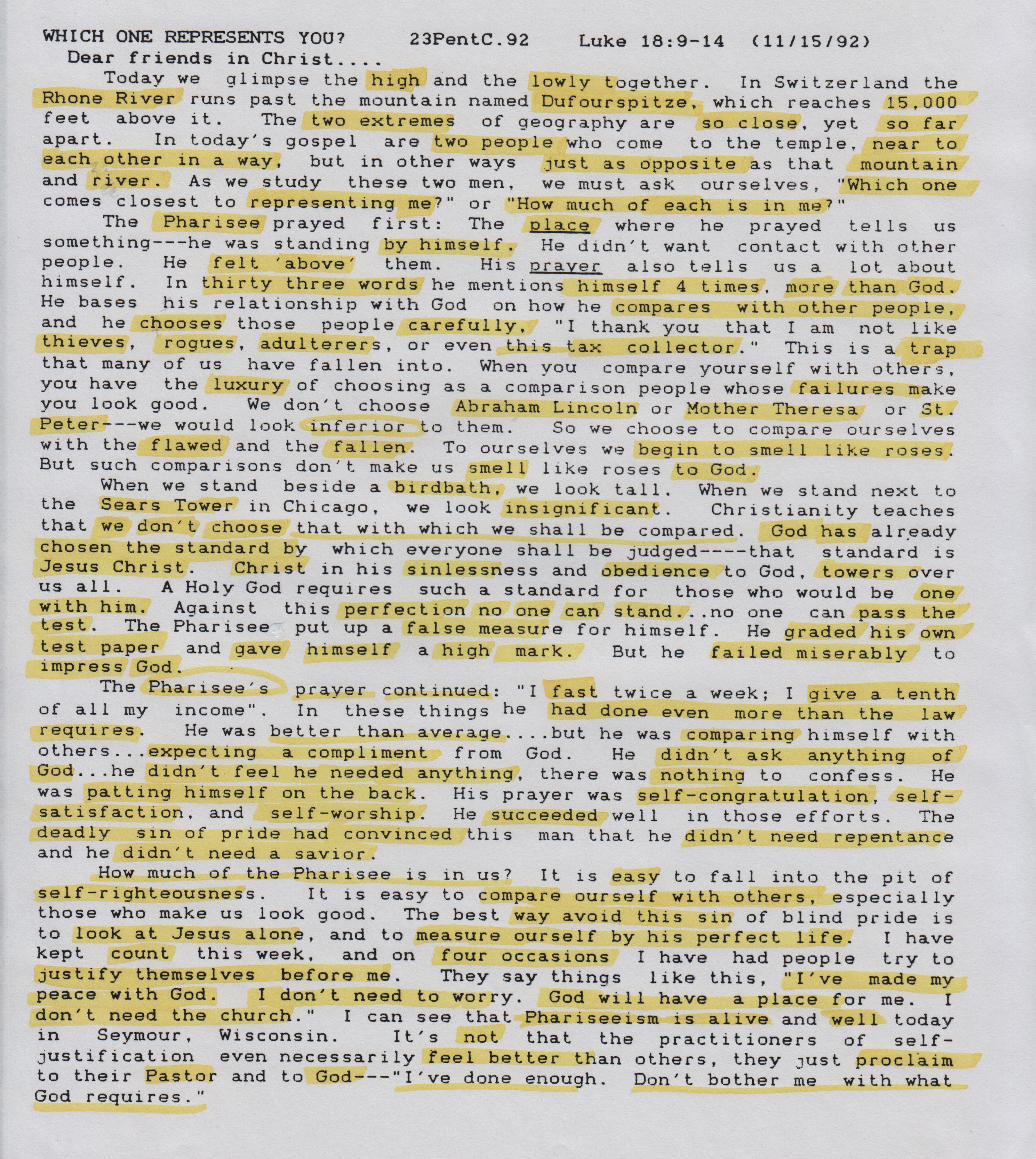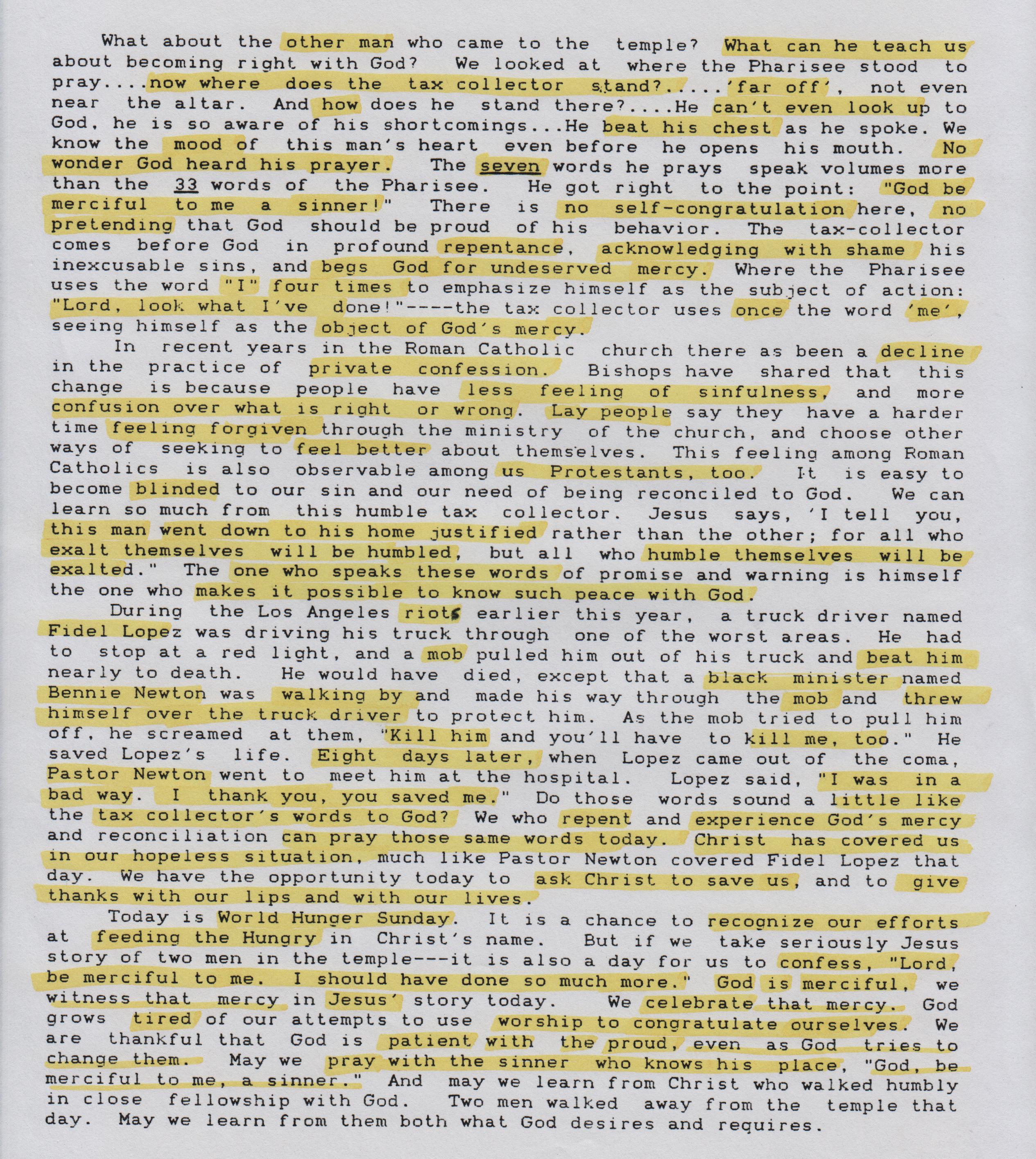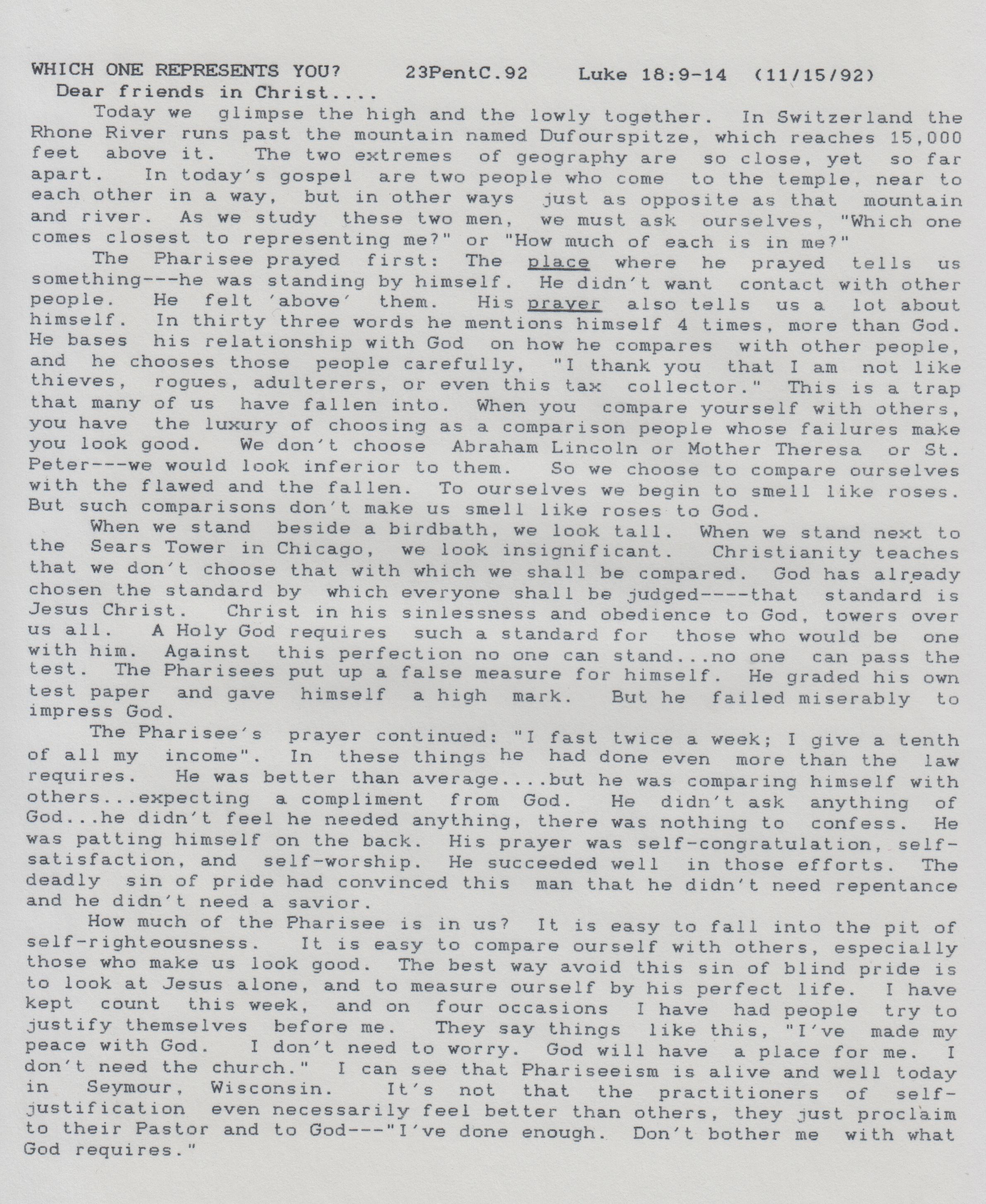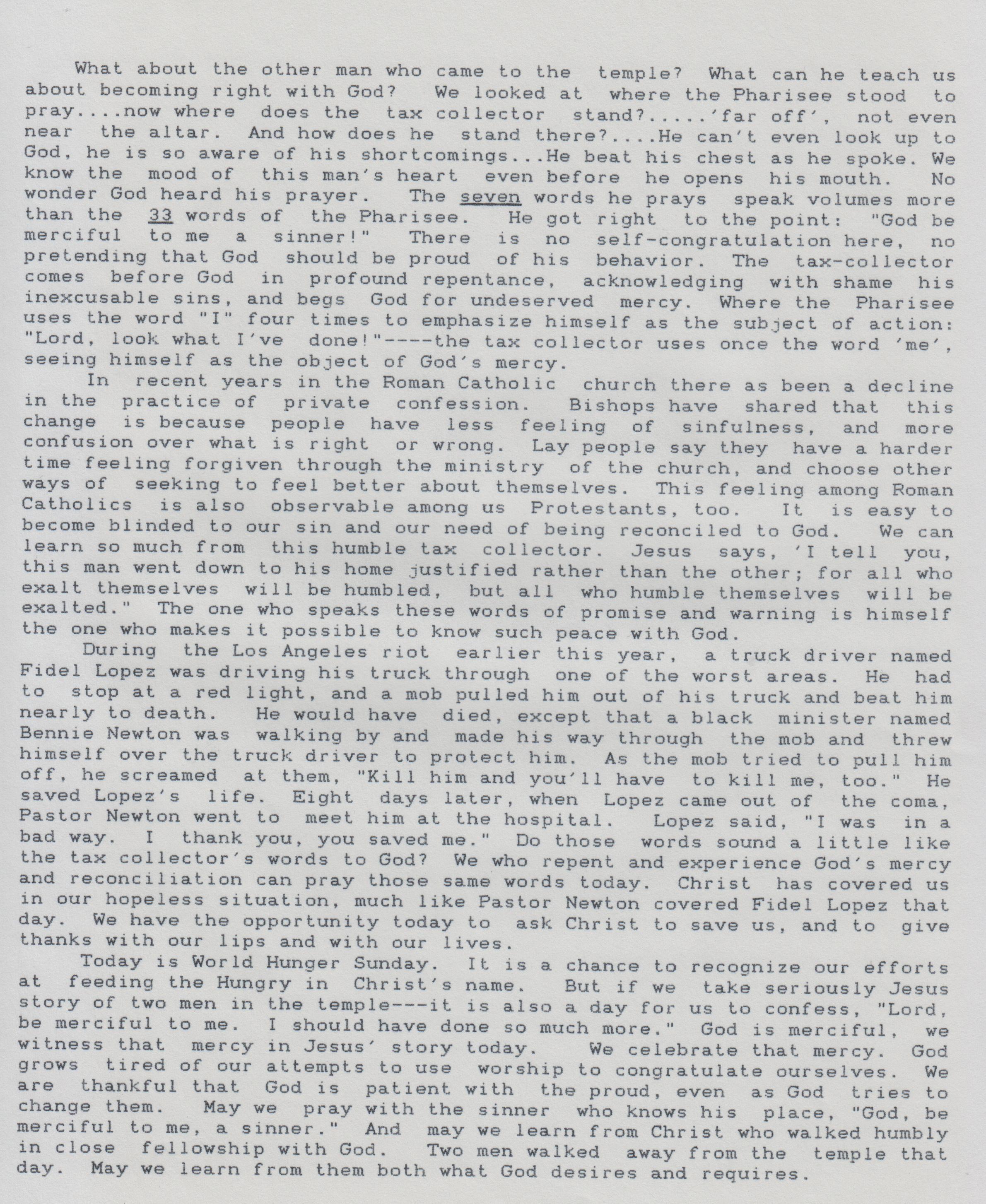Here is a Pentecost sermon that I have two different copies scanned. One copy is highlighted with yellow highlighter, and a copy that is not highlighted. I also used OCR from Google Docs to get a text version of the sermon.
The Gospel text for this sermon is Luke 18: 9-14. The sermon lists “23 Pentecost C” as the lectionary, but the Gospel text from Luke is now a part of the 20th Sunday after Pentecost in Year C of the Revised Common Lectionary.
The sermon mentions that it is World Hunger Sunday. It also mentions the recent occurance of the Los Angeles Riots. There is an additional story about the beating of Fidel Lopez and Bennie Newton’s rescue attempt.
The sermon starts with a reference to the Dufourspitze mountain in Switzerland, which is the source of the thumbnail image by oargi, CC BY-SA 2.0.
Which One Represents You? - 20 Pent C - 11-15-1992




WHICH ONE REPRESENTS YOU? 23Pentc.92 Luke 18:9-14 (11/15/92) Dear friends in Christ…. Today we glimpse the high and the lowly together. In Switzerland the Rhone River runs past the mountain named Dufourspitze, which reaches 15,000 feet above it. The two extremes of geography are so close, yet so far apart. In today’s gospel are two people who come to the temple, near to each other in a way, but in other ways just as opposite as that mountain and river. As we study these two men, we must ask ourselves, “Which one comes closest to representing me?” or “How much of each is in me?”
The Pharisee prayed first: The place where he prayed tells us something—he was standing by himself. He didn’t want contact with other people. He felt above them. His prayer also tells us a lot about himself. In thirty three words he mentions himself 4 times, more than God. He bases his relationship with God on how he compares with other people, and he chooses those people carefully, “I thank you that I am not like thieves, rogues, adulterers, or even this tax collector.” This is a trap that many of us have fallen into. When you compare yourself with others, you have the luxury of choosing as a comparison people whose failures make you look good. We don’t choose Abraham Lincoln or Mother Theresa or St. Peter—we would look inferior to them. So we choose to compare ourselves with the flawed and the fallen. To ourselves we begin to smell like roses. But such comparisons don’t make us smell like roses to God.
When we stand beside a birdbath, we look tall. When we stand next to the Sears Tower in Chicago, we look insignificant. Christianity teaches that we don’t choose that with which we shall be compared. God has already chosen the standard by which everyone shall be judged—–that standard is Jesus Christ. Christ in his sinlessness and obedience to God, towers over us all. A Holy God requires such a standard for those who would be one with him. Against this perfection no one can stand…no one can pass the test. The Pharisees put up a false measure for himself. He graded his own test paper and gave himself a high mark. But he failed miserably to impress God.
The Pharisee’s prayer continued: “I fast twice a week; I give a tenth of all my income”. In these things he had done even more than the law requires. He was better than average…. but he was comparing himself with others…expecting a compliment from God. He didn’t ask anything of God…he didn’t feel he needed anything, there was nothing to confess. He was patting himself on the back. His prayer was self-congratulation, self satisfaction, and self-worship. He succeeded well in those efforts. The deadly sin of pride had convinced this man that he didn’t need repentance and he didn’t need a savior.
How much of the Pharisee is in us? It is easy to fall into the pit of self-righteousness. It is easy to compare ourself with others, especially those who make us look good. The best way avoid this sin of blind pride is to look at Jesus alone, and to measure ourself by his perfect life. I have kept count this week, and on four occasions I have had people try to justify themselves before me. They say things like this, “I’ve made my peace with God. I don’t need to worry. God will have a place for me. I don’t need the church.” I can see that Phariseeism is alive and well today in Seymour, Wisconsin. It’s not that the practitioners of self justification even necessarily feel better than others, they just proclaim to their Pastor and to God—“I’ve done enough. Don’t bother me with what God requires.”
What about the other man who came to the temple? What can he teach us about becoming right with God? We looked at where the Pharisee stood to pray….now where does the tax collector stand?…..‘far off’, not even near the altar. And how does he stand there?….He can’t even look up to God, he is so aware of his shortcomings…He beat his chest as he spoke. We know the mood of this man’s heart even before he opens his mouth. No wonder God heard his prayer. The seven words he prays speak volumes more than the 33 words of the Pharisee. He got right to the point: “God be merciful to me, a sinner!” There is no self-congratulation here, no pretending that God should be proud of his behavior. The tax-collector comes before God in profound repentance, acknowledging with shame his inexcusable sins, and begs God for undeserved mercy. Where the Pharisee uses the word “I” four times to emphasize himself as the subject of action: “Lord, look what I’ve done!”—-the tax collector uses once the word ‘me’, seeing himself as the object of God’s mercy.
In recent years in the Roman Catholic church there has been a decline in the practice of private confession. Bishops have shared that this change is because people have less feeling of sinfulness, and more confusion over what is right or wrong. Lay people say they have a harder time feeling forgiven through the ministry of the church, and choose other ways of seeking to feel better about themselves. This feeling among Roman Catholics is also observable among us Protestants, too. It is easy to become blinded to our sin and our need of being reconciled to God. We can learn so much from this humble tax collector. Jesus says, ‘I tell you, this man went down to his home justified rather than the other; for all who exalt themselves will be humbled, but all who humble themselves will be exalted." The one who speaks these words of promise and warning is himself the one who makes it possible to know such peace with God.
During the Los Angeles riot earlier this year, a truck driver named Fidel Lopez was driving his truck through one of the worst areas. He had to stop at a red light, and a mob pulled him out of his truck and beat him nearly to death. He would have died, except that a black minister named Bennie Newton was walking by and made his way through the mob and threw himself over the truck driver to protect him. As the mob tried to pull him off, he screamed at them, “Kill him and you’ll have to kill me, too.” He saved Lopez’s life. Eight days later, when Lopez came out of the coma, Pastor Newton went to meet him at the hospital. Lopez said, “I was in a bad way. I thank you, you saved me.” Do those words sound a little like the tax collector’s words to God? We who repent and experience God’s mercy and reconciliation can pray those same words today. Christ has covered us in our hopeless situation, much like Pastor Newton covered Fidel Lopez that day. We have the opportunity today to ask Christ to save us, and to give thanks with our lips and with our lives.
Today is World Hunger Sunday. It is a chance to recognize our efforts at feeding the Hungry in Christ’s name. But if we take seriously Jesus story of two men in the temple—it is also a day for us to confess, “Lord, be merciful to me. I should have done so much more.” God is merciful, we witness that mercy in Jesus’ story today. We celebrate that mercy. God grows tired of our attempts to use worship to congratulate ourselves. We are thankful that God is patient with the proud, even as God tries to change them. May we pray with the sinner who knows his place, “God, be merciful to me, a sinner.” And may we learn from Christ who walked humbly in close fellowship with God. Two men walked away from the temple that day. May we learn from them both what God desires and requires.